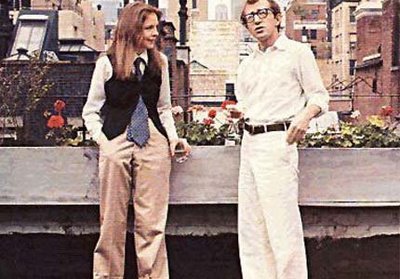February 16, 2010
I Don't Respond Well To Mellow
Annie Hall is pretty much a perfect film. But as David Kimmel describes in I'll Have What She's Having: Behind the Scenes at the Great Romantic Comedies, it didn't start out that way. The original version of the film was an epic disaster, in dire need of hacking and kneading:

In the editing room, Annie Hall was an incoherent mess. [Co-writer] Marshall Brickman was appalled. “To tell you the truth, when I saw the rough cut of Annie Hall, I thought it was terrible, completely unsalvageable. It was two and a half hours long and rambled and was tangential and just endless.”That's not overly surprising. A lot of Woody Hall's earlier films are, well, funny, but not exactly coherent—usually the plots are thin and heavily improvised, existing only so that there's something to hang an endless series of jokes and gags on. (They were basically live-action versions of his New Yorker pieces from the time.) And the movies work because the jokes and gags are hilarious. But with Annie Hall, it seems he finally pushed that habit to excess, at least in his first go-round. But hey, it's a good thing he did! Otherwise his editors might never have decided that enough was enough.
The original version was essentially Alvy free-associating about his life and his worries. Annie (Diane Keaton) was seen briefly and then disappeared from the movie for fifteen minutes. … Even the scenes with Annie—they were already there, of course—led to fantasies and flashbacks galore. The sequence where Alvy, Annie, and Rob (Tony Roberts) head to Brooklyn originally ran ten to fifteen minutes and had many more scenes than the one to two we see in the final film. Alvy and his date from Rolling Stone (Shelly Duvall) spun off to a scene where they wound up in the Garden of Eden talking to God. When Alvy is arrested in Los Angeles (after playing bumper cars in the parking lot), there was a long scene of him interacting with the other prisoners in his cell.
Like the sculptor who chips away at the block so that the statue hidden inside can emerge, Allen and [editor Ralph] Rosenblum began hacking away at the movie to see if there was something in the material worth saving. “It was clear to Woody and me that the film started moving whenever the present-tense material with him and Keaton dominated the screen, and we began cutting in the direction of that relationship,” Rosenblum later wrote. They tossed out entire sequences, tightened things up, and always kept the focus on Alvy and Annie. Even the scenes of flashbacks to Alvy’s earlier marriages were greatly shortened. Some characters were eliminated altogether. Said Allen, “There was a lot of material taken out of that picture that I thought was wonderfully funny. … It wasn’t what I intended to do. I didn’t sit down with Marshall Brickman and say, ‘We’re going to write a picture about a relationship.”
P.S. Though it's worth noting that sometimes the editors were too zealous. They had originally, for instance, cut out the famous scene with Annie's brother Duane. It was only later, once the film started doing well in front of test audiences and they figured eh, maybe they could afford a few indulgences here and there, that they snuck Duane back in. It's funny to think how Christopher Walken's career might've unfolded if they'd kept that bit out, since that was a big early break. Maybe he doesn't go on to do Deer Hunter the following year? And then what?
